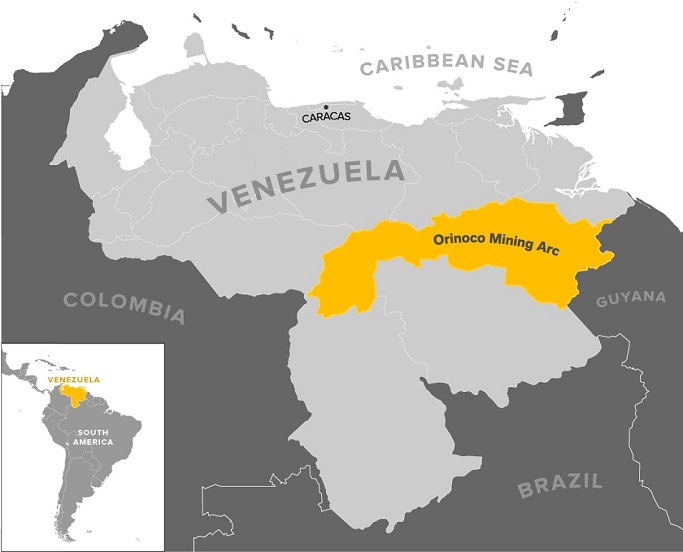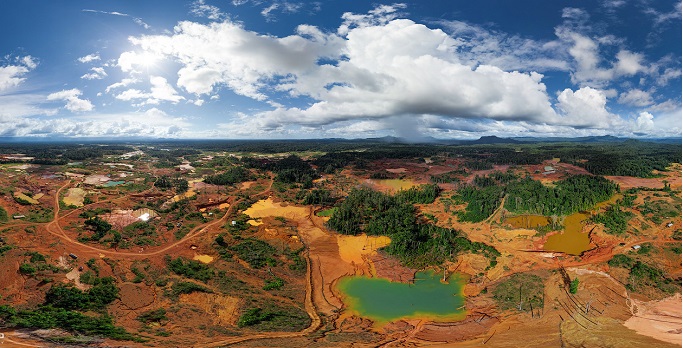2024-11-29 22:11:24
There are around 40.3 million people in situations of slavery worldwide, and mining is one of the sectors where this phenomenon is most frequent.

The Orinoco Mining Arc, an area located in southeastern Venezuela, spans approximately 112,000 square kilometers and is home to one of the largest reserves of gold, coltan, diamonds, and other minerals in the world (UNEP, 2016). However, despite its economic potential, the exploitation of these resources has brought about ecocide and countless human rights violations, including human trafficking and modern slavery. In this opinion piece, the negative impacts of mining activities in the Mining Arc are explored, and the international community is urged to take action to protect both the environment and human lives.
Ecocide in the Mining Arc
The term "ecocide" refers to the massive and systematic destruction of natural ecosystems and the loss of biodiversity. In the case of the Orinoco Mining Arc, this is manifested through water pollution, deforestation, and soil degradation, among other environmental issues. For example, mining exploitation has led to the deforestation of 1,200 km² in the region since 2016, representing a 200% increase compared to the previous deforestation rate (Global Forest Watch, 2021).
Additionally, mineral extraction, especially gold, often uses mercury, a highly toxic element that contaminates rivers and bodies of water. According to a Human Rights Watch report (2019), mercury pollution in the region is up to 500 times higher than safe levels established by the World Health Organization (WHO). This pollution not only affects local fauna and flora but also indigenous and rural communities that depend on water for their subsistence and human consumption.
Human Rights Violations
Mining exploitation in the Orinoco Mining Arc has been linked to multiple human rights violations, including human trafficking and modern slavery. According to the United Nations Office on Drugs and Crime (UNODC) 2020 Global Report on Trafficking in Persons, Venezuela is one of the main countries of origin, transit, and destination for victims of human trafficking in Latin America.
The human trafficking networks recruit both Venezuelans and migrants from neighboring countries with the promise of employment and stable income in the mines. However, once in the region, these individuals are subjected to forced labor, sexual exploitation, and violence (Amnesty International, 2019). Moreover, the forced recruitment of minors in mining activities, as well as their sexual exploitation, have also been reported in the area (UNICEF, 2019).
Modern slavery is also a severe problem in this region. The International Labor Organization (ILO) estimates that there are around 40.3 million people in situations of slavery worldwide, and mining is one of the sectors where this phenomenon is most frequent (ILO, 2017). In the case of the Orinoco Mining Arc, people in situations of slavery are forced to work in deplorable conditions, without access to medical care and without fair wages or remuneration (Human Rights Watch, 2019).
Furthermore, the control of the area by illegal armed groups and criminal organizations has intensified violence and insecurity in the region. These groups benefit from mining exploitation and use violence to control local communities and maintain their dominance over smuggling and mineral transportation routes (International Crisis Group, 2020). As a result, indigenous and rural communities living in the region face constant threats to their physical integrity and security.

Outstanding Issue for the Venezuelan State
The situation of the Orinoco Mining Arc is a socio-environmental conflict that represents an outstanding issue for the Venezuelan State. The exploitation of mineral resources in the region has generated severe consequences for both the environment and local communities, and its proper management has been hampered by political, economic, and social factors.
From a political perspective, the Venezuelan state has been criticized for its lack of transparency and regulation in mining exploitation in the area According to a report by Transparency Venezuela (2018), the lack of information and reliable data on mining activities in the region has contributed to the deterioration of the environment and the violation of human rights. Moreover, the presence of illegal armed groups and criminal organizations in the area has generated a climate of impunity and corruption that has hindered the implementation of effective policies to protect the environment and ensure the human rights of affected communities (International Crisis Group, 2020).
From an economic perspective, the lack of employment alternatives and economic opportunities in the region has led many people to depend on mining exploitation as their only source of income. A study by the Venezuelan Program of Education-Action in Human Rights (PROVEA, 2019) indicates that over 100,000 people work in precarious conditions in the Mining Arc area. This has generated a spiral of poverty and labor exploitation, which is aggravated by human trafficking and modern slavery in the region. The promotion of sustainable development projects and economic diversification is essential to combat this phenomenon.
From an environmental perspective, mining exploitation has caused severe ecological damage, including deforestation, water pollution, and loss of biodiversity. According to the United Nations Environment Programme (UNEP, 2016), approximately 1,100 km² of land have been deforested in the region since the beginning of mining activities, leading to the degradation of local ecosystems and the loss of habitats for numerous endangered species.
To address this socio-environmental conflict, it is crucial for the Venezuelan state to adopt measures to improve the regulation and control of mining activities, protect the environment, and ensure the human rights of affected communities. This includes promoting sustainable development projects and economic diversification that provide alternatives to mining exploitation.
The Role of the International Community
Faced with this bleak scenario, it is crucial that the international community takes action to curb ecocide and human rights violations in the Mining Arc. First, international organizations and governments of mineral-importing countries must establish regulations and control mechanisms to ensure that minerals extracted in the region are not the product of illegal activities, labor exploitation, or environmental damage.
Additionally, human rights and environmental organizations need to work together to document and report human rights violations and ecological damage in the region.
Cooperation among governments, non-governmental organizations, and affected communities is essential to raise global awareness of the problem and develop effective strategies to address it.
An example of international community involvement in this socio-environmental conflict is the work of the Working Group on the issue of human rights and transnational corporations and other businesses, established by the United Nations Human Rights Council. In its 2020 report, the Working Group highlighted concerns about human rights violations and environmental damage in the region and recommended that the Venezuelan government and involved companies take measures to ensure respect for human rights and environmental protection (OHCHR, 2020).
As for civil society, international organizations such as Amnesty International, Global Witness, and Human Rights Watch have documented and denounced this situation, contributing to increased public awareness and political pressure on the Venezuelan government and companies involved in mining exploitation in the region (Amnesty International, 2019; Global Witness, 2020; Human Rights Watch, 2021).
International cooperation is also crucial for supporting affected communities in the region. For example, the International Organization for Migration (IOM) has provided technical and financial assistance to programs that address victims of human trafficking and labor exploitation in Venezuela (IOM, 2020).
Therefore, the international community plays a key role in denouncing and mitigating the negative impacts of the Orinoco Mining Arc. Collaboration among governments, international organizations, non-governmental organizations, and civil society is essential to address this socio-environmental conflict and ensure the protection of human rights and the environment.

Conclusion
The situation in the Orinoco Mining Arc is a clear example of how a socio-environmental conflict can lead to devastating consequences for both the environment and the people living in the region. The combination of ecocide, human rights violations, human trafficking, and modern slavery in this area of Venezuela highlights the need to address the problem comprehensively and effectively, involving all relevant actors at the national, regional, and international levels.
The severity of this socio-environmental conflict cannot be underestimated. The degradation of the ecosystem and the loss of biodiversity in the region have a negative impact not only on the local environment but also on the global environmental balance and the fight against climate change. Additionally, human rights violations and practices of modern slavery and human trafficking in the area represent an attack on the dignity and freedom of thousands of people, particularly indigenous communities and vulnerable groups.
It is essential to bring this conflict into public debate, both nationally and internationally, to raise awareness and mobilize resources and efforts in search of sustainable and fair solutions. The international community, including governments, non-governmental organizations, academic institutions, and multilateral agencies, must come together to advocate for effective measures that address the structural causes of the problem and promote respect for human rights and environmental protection in the region.
This includes strengthening legal and regulatory frameworks in mining exploitation, promoting sustainable development projects that offer economic alternatives to local communities, protecting and restoring the rights of victims of human trafficking and modern slavery, and creating partnerships and mechanisms for regional and international cooperation to address the problem jointly and in a coordinated manner.
Ultimately, the solution to this socio-environmental conflict depends on the political will and decisive action of all actors involved. Only through a collaborative and committed approach can we guarantee a sustainable future that respects human rights for affected communities and our common home, the planet.
Rosmel Rodriguez
EU Climate Pact Ambassador
Most Viewed

Elephants, Giant Harmless Animals
2024-11-29 22:11:23

Commercial whaling and climate change are inhibiting evolutionary change in Arctic whales
2024-11-29 22:11:24

World Environment Day: 5th June
2024-11-29 22:11:24

Talking About Earth Day at Havre de Grace Maritime Museum
2024-11-29 22:11:24

Lithium: Global Projects and Policies of Economic Powers
2024-11-29 22:11:24
Comment

Why we need a UN Treaty on plastic pollution The Ellen MacArthur Foundation is a UK charity working on business, learning, insights & analysis, and communications to accelerate the transition towards the circular economy.

Air Pollution for Kids Air is all around us and we need it to survive.

Why We Need to Stop Plastic Pollution? Our oceans are being filled and killed by throwaway plastics.

Climate Change, Ecological Crisis and Sustainability We are all agents for change in climate action.

Climate Racism Climate Racism: Social Inequalities in the Age of Climate Change
Brigitte Colman
2024-11-30
Notre vie est menacée par le réchauffement climatique et toutes les mesures ne sont pas efficaces.